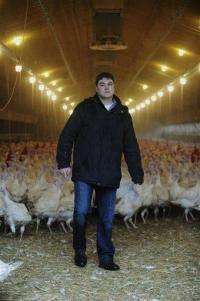Germany halts pork, egg sales in dioxin scare

(AP) -- Germany froze sales of poultry, pork and eggs from more than 4,700 farms Friday to stem the spread of food contaminated with cancer-causing dioxin, as fears grew that farmers could have been using tainted livestock feed for months.
South Korea and Slovakia on Friday banned the sale of some animal products imported from Germany, while authorities in Britain and the Netherlands were investigating whether food containing German eggs - like mayonnaise or liquid egg products - was safe to eat.
Prosecutors in the northern state of Schleswig-Holstein launched an investigation into the German firm Harles & Jentzsch GmbH, suspecting the company knew but failed to tell authorities that fat it had produced for use in feed pellets was tainted with dioxin. The state agriculture ministry said Friday it had information that the company had been producing tainted fat for months - a declaration that shocked federal officials.
"If it is confirmed that the company knew since March that its fat was tainted but it did not inform authorities than that is highly criminal activity," Agriculture Minister Ilse Aigner told n-tv television.
Test results published Friday by the Schleswig-Holstein agriculture ministry showed that some of the fat contained more than 77 times the approved amount of dioxin. Out of 30 samples tested so far, 18 contained more dioxin than legally allowed, it said.
Dioxins are contaminants that often result from industrial combustion and other chemical processes. Exposure to dioxins at high levels is linked to an increased incidence of cancer. Dioxin levels tend to be highest in eggs because of the high fat content in eggs.
Authorities believe up to 150,000 tons of feed pellets for poultry and swine may contain the contaminated industrial fat produced by Harles & Jentzsch.
Harles & Jentzsch did not immediately respond Friday to calls seeking comment. But chief Siegfried Sievert told the Westfalen Blatt daily earlier this week the company believed that byproducts from palm, soy and rapeseed oil used to make organic diesel fuels were safe for use in livestock feed.
Agriculture Ministry spokesman Holger Eichele said all of Germany's 17 states were also carrying out tests on milk and meat as an extra precaution. According to the most recent tests on eggs from farms where chickens ate the contaminated feed, he said "two-thirds have been clean and about one-third have been right on the border of what is considered dangerous."
The scandal broke after regular random testing revealed excessive dioxin levels in eggs from chickens in western Germany earlier this week. More than 8,000 chickens were ordered slaughtered and tainted food fears spread to Germany's famous pork industry.
Germany's Agriculture Ministry said Friday it had no immediate reports of health problems connected to the contaminated food, but it froze the slaughter of all livestock from certain farms until more tests could be carried out. About 1 percent of the country's farms have been affected so far.
"This strategy is resulting in a high number of closed farms, which in the course of testing and clarification in the coming days will be reduced," Aigner said.
Food safety experts said, however, that the amount of dioxin that might eventually reach humans was probably not enough to trigger a health scare.
"The concentrations detected in this case are above the legal tolerance limits, but only just. That tells you that the potential risk of harm from these eggs is very low," said Chris Elliott, an expert in food safety at Queens University, Belfast.
Geert De Poorter, lab director general at the Belgian food safety agency, told The Associated Press that compared to the 1999 dioxin food scare in his country, the amounts found in Germany so far have been minor.
"If we assess the figures we've got from Germany regarding tainted products and we extrapolate that to compare with the Belgian crisis, then we have a rough estimate of 50 to 100 times (less)," De Poorter said.
In 1999, dioxin from motor oil was mixed into animal feed in Belgium, leading to widespread import bans and food being pulled from the market. That scandal prompted the European Union to establish maximum levels for dioxins in livestock feed in 2001.
In Brussels, the European Commission said it was "closely monitoring the situation" but praised German authorities' rapid reaction to developments.
German farmers are demanding compensation for losses they estimate at up to euro60 million ($79 million) a week, but Eichele said it was still too early to determine the overall damage from the tainted feed.
"We first need to find out what led to this," Eichele said. "It needs to be cleared, then we need to see how severe the damage is and then how we can best help those farmers."
©2010 The Associated Press. All rights reserved. This material may not be published, broadcast, rewritten or redistributed.
















